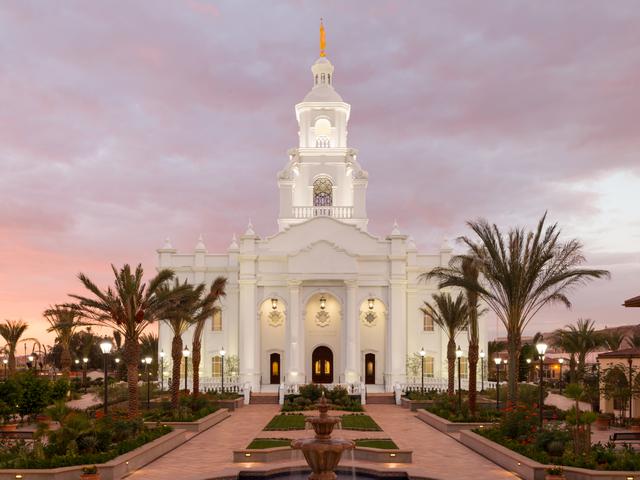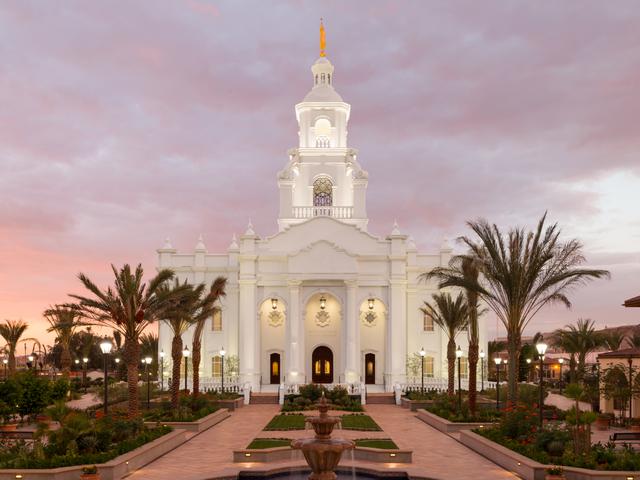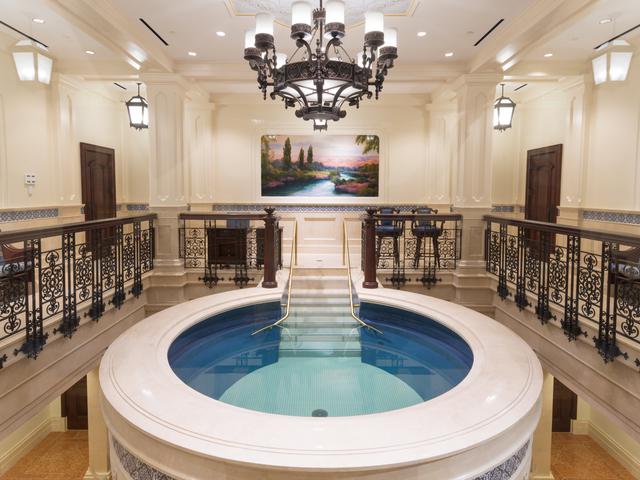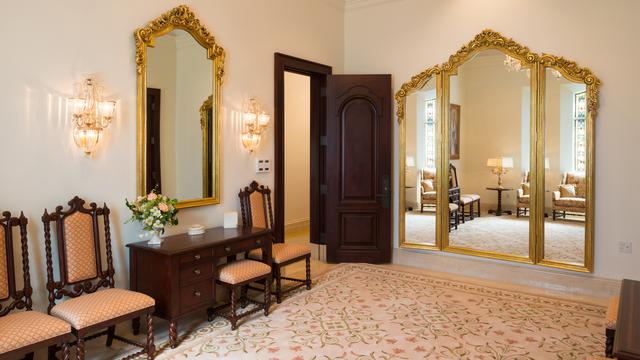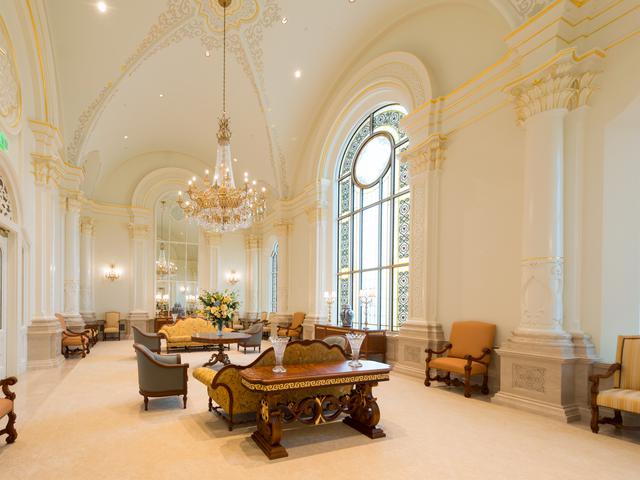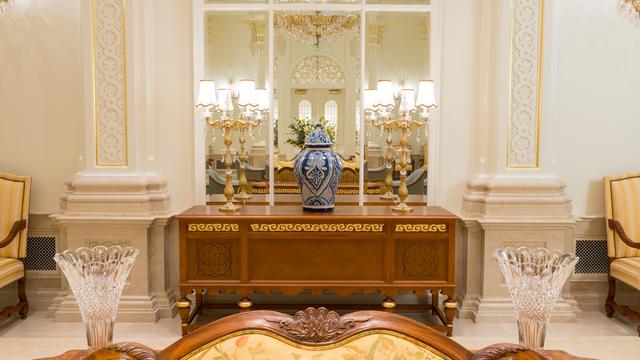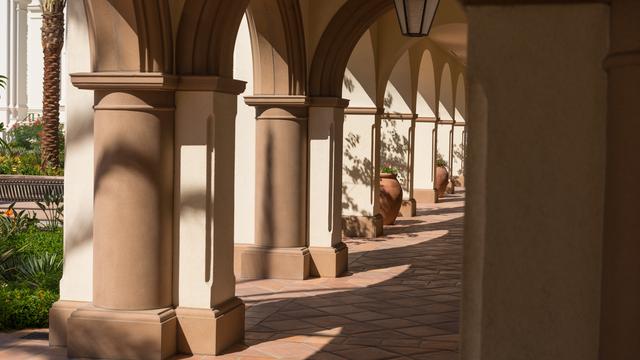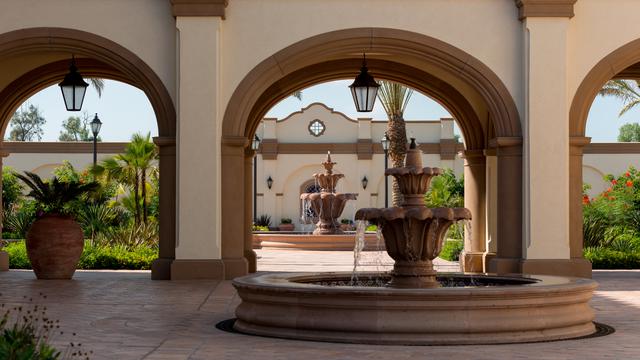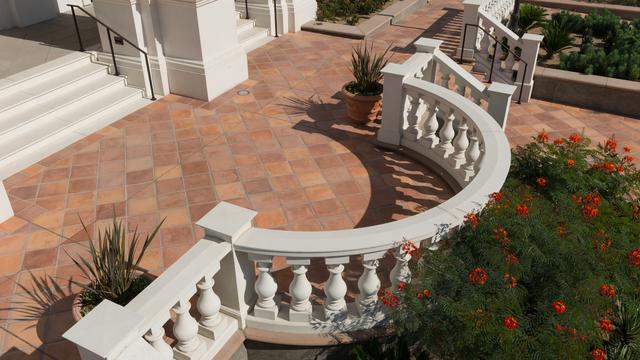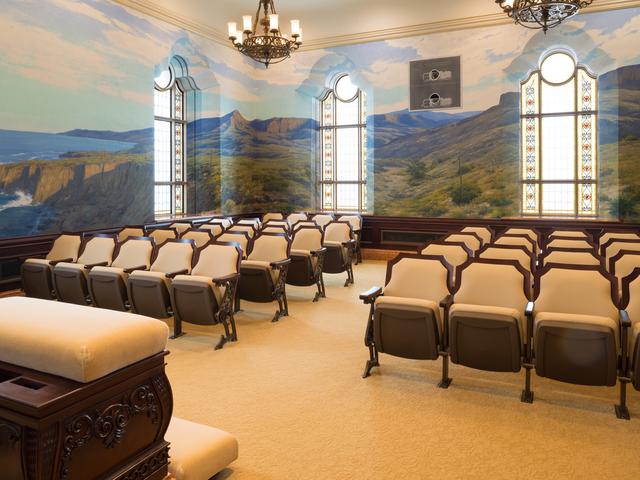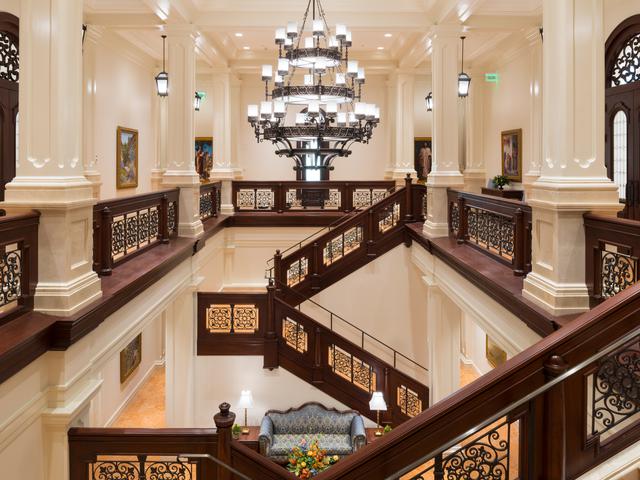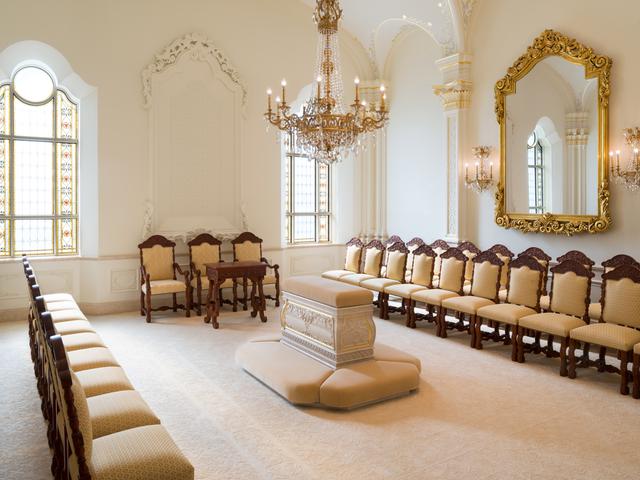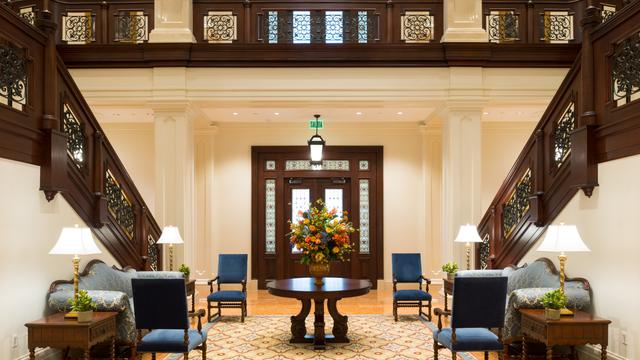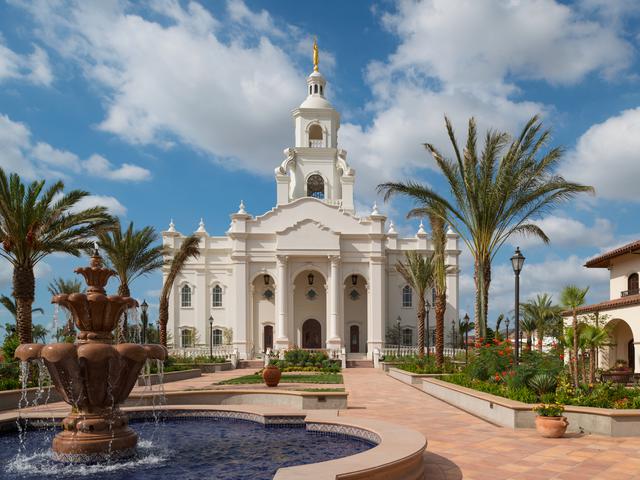Difference between revisions of "Tijuana México Temple"
m |
|||
| (7 intermediate revisions by the same user not shown) | |||
| Line 1: | Line 1: | ||
| − | [[Image:tijuana-mexico-temple.jpg| | + | [[Image:tijuana-mexico-temple.jpg|400px|thumb|alt=Tijuana México Temple|right|frame|<span style="color:#0D8ED3"> |
| + | Tijuana Mexico Temple]] | ||
| − | On 2 October 2010, during the opening of the 180th [[General Conference]] of [ | + | On 2 October 2010, during the opening of the 180th [[General Conference]] of [http://comeuntochrist.org The Church of Jesus Christ of Latter-day Saints], President [[Thomas S. Monson]] announced the construction of a new temple in Tijuana, México. The '''Tijuana México Temple''' became the 13th temple to be in operation in Mexico. It is located on Paseo del Río in southeastern Tijuana with a backdrop of the beautiful Cerro Colorado, a landmark hill in eastern Tijuana, near Macroplaza on Boulevard Insurgentes, which bears white letters near the peak that state: Jesucristo es el Señor (Jesus Christ is Lord). |
| − | The | + | The Tijuana Mexico Temple is the first Latter-day Saint temple built in Mexico since one was completed a decade previously in the northern industrial city of [[Monterrey Mexico Temple|Monterrey]]. Its geographic service area is Baja California and the Sonoran border community of San Luis Río Colorado. Prior to its dedication, Latter-day Saints from the area had to cross the U.S. border to attend the [[San Diego California Temple]]. However, travel restrictions and long delays at the U.S.-Mexico border forced many members to make the 8- to 10-hour drive to the [[Hermosillo Sonora Mexico Temple]] to participate in temple ordinances. |
| − | Total Church membership in | + | The Church of Jesus Christ experienced rapid growth in Tijuana in the years leading up to the announcement of the Tijuana México Temple. There are six [[Stake|stakes]] in the city of Tijuana with nearby stakes located in the states of Baja California and Sonora. Total Church membership in Mexico is reported at 1.5 million. |
| − | ==Site Dedication and | + | ==Site Dedication and Groundbreaking Ceremony== |
| − | On the morning of Saturday, 18 August 2012, some 2,000 faithful Latter-day Saints gathered to a barren lot in eastern Tijuana to participate in the site dedication and groundbreaking ceremony for the Tijuana | + | On the morning of Saturday, 18 August 2012, some 2,000 faithful Latter-day Saints gathered to a barren lot in eastern Tijuana to participate in the site dedication and groundbreaking ceremony for the Tijuana Mexico Temple. The design of the landmark building reflects the Spanish Colonial influences that characterize much of Mexican architecture including the Spanish missions found throughout Mexico and the southwestern United States—specifically the San Xavier del Bac Mission in Tucson, Arizona. Elder [[Benjamin de Hoyos]] of the [[Seventy]], First Counselor in the Mexico Area presidency, presided at the event. [http://www.ldschurchtemples.com/tijuana/ He commented], "Those early Spanish friars were very valiant in their preaching and building. And today, we in Mexico are very comfortable with the style of those churches. The temple will be an emblem for the entire Tijuana community." The brilliant white exterior of the sacred edifice symbolizes the holy purpose of the temple, which is crowned with a distinctive central tower, lifting the eyes heavenward. Towering palm trees and colorful landscaping will decorate the temple grounds. |
Dominga G. Sifuentes, who was baptized in 1964, stated, "I remember when the first chapel was built here. We had 30 members then. Now we have a temple. I've watched the Church grow and have seen many chapels constructed, but the temple brings a special air of peace and tranquility." Elder De Hoyos further commented, "We've seen in other Mexican cities where a temple has been built that there is a new-found peace in the city itself. Not only in Mexico, but in other Latin American countries I've visited, a temple can be a real factor in bringing a sense of security and prosperity. And we feel certain much the same thing will happen here." | Dominga G. Sifuentes, who was baptized in 1964, stated, "I remember when the first chapel was built here. We had 30 members then. Now we have a temple. I've watched the Church grow and have seen many chapels constructed, but the temple brings a special air of peace and tranquility." Elder De Hoyos further commented, "We've seen in other Mexican cities where a temple has been built that there is a new-found peace in the city itself. Not only in Mexico, but in other Latin American countries I've visited, a temple can be a real factor in bringing a sense of security and prosperity. And we feel certain much the same thing will happen here." | ||
| − | ==History of The Church of Jesus Christ of Latter-day Saints in | + | ==History of The Church of Jesus Christ of Latter-day Saints in Mexico== |
| − | The history of The Church of Jesus Christ of Latter-day Saints in | + | The history of The Church of Jesus Christ of Latter-day Saints in Mexico goes back to 1875, when [[Brigham Young]], then President of the Church, sent [[Daniel W. Jones]] to lead a small group of six missionaries to La Ciudad de México (Mexico City) to distribute Spanish language materials about the Church to Mexican leaders. One of these brochures about the [[Book of Mormon]] fell into the hands of Plotino Rhodacanaty, who after reading it, wrote to President [[John Taylor]], Brigham Young’s successor, to request more information about the Church. |
| − | Upon arriving in | + | Upon arriving in Mexico in 1876, the missionaries divided into two groups. In 1876, Helaman Pratt and Meliton Trejo, a Spanish convert, traveled to Hermosillo, Sonora, where they baptized the first five members in Mexico. In 1885, a group of nearly 400 colonists from Utah arrived at the northern Mexico Casas Grandes River and acquired property. Mexico's first stake (similar to a diocese) was created in Colonia Juárez in 1895. By 1912, more than 4,000 members had settled in Chihuahua and Sonora. |
| − | When Rey L. Pratt returned to central | + | When [[Rey L. Pratt]] returned to central Mexico in November of 1917, he found the members had remained faithful in spite of difficult living circumstances. Local Mexican leaders again maintained stability and expanded proselyting work, and in 1930, six local missionaries were called to serve. The first missionaries arrived from San Diego, California, in the 1940s, and local families formed a group that met for worship services in the house of a member. |
| − | In 1946, Church President [[George Albert Smith (Prophet)|George Albert Smith]], visited Church members in México, who then numbered more than 5,300. The first congregation of the Church was organized in Tijuana on 25 April 1954. On 3 December 1961, the | + | In 1946, Church President [[George Albert Smith (Prophet)|George Albert Smith]], visited Church members in México, who then numbered more than 5,300. The first congregation of the Church was organized in Tijuana on 25 April 1954. On 3 December 1961, the Mexico Stake was created, with Harold Brown as President. Membership at that time numbered nearly 25,000. Church schools were begun in Mexico in 1959. On 3 April 1976, a temple was announced for La Ciudad de México (Mexico City) and the completed temple was dedicated on 2 December 1983 by President [[Gordon B. Hinckley]]. At that time, membership in Mexico was conservatively numbered at about 240,000. And, on 23 May 1976, the first Tijuana [[stake]] (similar to a diocese) was established, with Carlos Mendez Zullik as its first President. |
| − | + | Mexico was the first country outside the United States to have 100 Latter-day Saint stakes. An historic moment came on 29 June 1993, when the Mexican government formally registered the Church, allowing it to own property. President [[Howard W. Hunter]] visited Mexico to create the Mexico City Contreras Stake, the Church's 2,000th, on 11 December 1994. | |
==A Picturesque Tour of the Tijuana México Temple== | ==A Picturesque Tour of the Tijuana México Temple== | ||
| Line 46: | Line 47: | ||
</gallery> | </gallery> | ||
| − | ==Open House and Cultural Celebration | + | ==Open House and Cultural Celebration== |
| − | A | + | A public open house for the Tijuana Mexico Temple was held from Friday, 13 November 2015, through Saturday, 28 November 2015. There was not an open house on Sunday 15 and 22 November 2015. The general public, including children of all ages, was invited to attend the open house. Admission was free, and no tickets were required. The open house was conducted on Mondays from 9:00 a.m until 5:00 p.m, and on Tuesday through Saturday from 9:00 a.m. until 8:00 pm. All times are Pacific Standard Time (PST). Modest dress was requested. |
Open house tours began with a short video presentation providing an overview of temples and why they are significant to members of The Church of Jesus Christ. Following the video presentation, a tour host escorted visitors through the temple, explaining the purpose of each room and answering questions as time allowed. At the conclusion of the tour, guests were invited to a reception area to have any further questions answered. | Open house tours began with a short video presentation providing an overview of temples and why they are significant to members of The Church of Jesus Christ. Following the video presentation, a tour host escorted visitors through the temple, explaining the purpose of each room and answering questions as time allowed. At the conclusion of the tour, guests were invited to a reception area to have any further questions answered. | ||
| − | On Saturday evening, 12 December 2015, hundreds of youth participated in a cultural celebration highlighting the history of the Church in México performed through dance and music. | + | On Saturday evening, 12 December 2015, hundreds of youth participated in a cultural celebration highlighting the history of the Church in México performed through dance and music. |
| − | == Tijuana | + | == Tijuana Mexico Temple Dedication== |
| − | The Tijuana | + | The Tijuana Mexico Temple was dedicated in three sessions on Sunday, 13 December 2015. President [[Dieter F. Uchtdorf]], Second Counselor in the [[First Presidency]] of [[The Church of Jesus Christ of Latter-day Saints]] presided at the dedicatory services. The dedicatory sessions at 9:00 a.m., 12:00 p.m., and 3:00 p.m. were broadcast within the temple district, and the three-hour block of meetings for those congregations were cancelled for that Sunday to allow members to attend the sessions. |
During the traditional cornerstone ceremony signifying that the temple is complete, President Uchtdorf called on the assistance of Church leaders and local Latter-day Saints to help him place mortar around the cornerstone. In his remarks to the Saints present, [http://ldsmag.com/149th-temple-in-the-world-is-dedicated-in-tijuana-mexico/ he said], "We love you. We bring you the love and greetings of President [[Thomas S. Monson|Monson]]. His heart is here. He will participate by internet, by television. He will see it. He will hear you. He will feel your spirit. So, blessings to you from him. Blessings to you from us.” | During the traditional cornerstone ceremony signifying that the temple is complete, President Uchtdorf called on the assistance of Church leaders and local Latter-day Saints to help him place mortar around the cornerstone. In his remarks to the Saints present, [http://ldsmag.com/149th-temple-in-the-world-is-dedicated-in-tijuana-mexico/ he said], "We love you. We bring you the love and greetings of President [[Thomas S. Monson|Monson]]. His heart is here. He will participate by internet, by television. He will see it. He will hear you. He will feel your spirit. So, blessings to you from him. Blessings to you from us.” | ||
| − | President Uchtdorf was assisted at the dedication services by Elder [[Dallin H. Oaks]] of the [[Quorum of the Twelve Apostles]], Elder [[Larry Y. Wilson]] of the [[Seventy]] and executive director of the Temple Department, and members of the Mexico Area Presidency — Elders [ | + | President Uchtdorf was assisted at the dedication services by Elder [[Dallin H. Oaks]] of the [[Quorum of the Twelve Apostles]], Elder [[Larry Y. Wilson]] of the [[Seventy]] and executive director of the Temple Department, and members of the Mexico Area Presidency — Elders [Benjamin De Hoyos], [[Paul B. Pieper]] and [[Arnulfo Valenzuela]], also of the Seventy. He further commented, "It’s the Lord’s house and it’s a connection between heaven and earth. So, remember that when you come here that you feel that the ways between heaven and earth intersect. An intersection of the spiritual and our life here on |
earth.” | earth.” | ||
| − | The | + | The Tijuana México Temple will serve the 45,000 Latter-day Saints living in the region including those living in Tijuana, Rosarito, Tecate, Mexicali, Ensenada, San Luis Rio Colorado, San Quintín, San Felipe, and Guerrero Negro. |
| − | + | {{TemplesMexico}} | |
<br> | <br> | ||
| Line 75: | Line 76: | ||
<embedvideo service="youtube" urlargs="rel=0" dimensions="400" alignment="inline">https://youtube.com/watch?v=es0QwNY9QXc&rel=0</embedvideo> | <embedvideo service="youtube" urlargs="rel=0" dimensions="400" alignment="inline">https://youtube.com/watch?v=es0QwNY9QXc&rel=0</embedvideo> | ||
| + | ==External Links== | ||
| + | * [https://www.churchofjesuschrist.org/temples/details/tijuana-mexico-temple?lang=eng Official Tijuana Mexico Temple page] | ||
| + | * [https://churchofjesuschristtemples.org/tijuana-mexico-temple/ Tijuana Mexico Temple page] | ||
| + | * [https://www.churchofjesuschrist.org/church/news/tijuana-mexico-temple-dedicatory-prayer?lang=eng Tijuana Mexico Temple dedicatory prayer] | ||
| + | * [https://www.churchofjesuschrist.org/manual/families-and-temples/what-is-the-purpose-of-the-temple?lang=eng What is the Purpose of the Temple] | ||
| + | * [https://www.churchofjesuschrist.org/comeuntochrist/article/temples What Are Temples?] | ||
[[Category:Temples]] | [[Category:Temples]] | ||
Latest revision as of 14:47, 18 November 2022
On 2 October 2010, during the opening of the 180th General Conference of The Church of Jesus Christ of Latter-day Saints, President Thomas S. Monson announced the construction of a new temple in Tijuana, México. The Tijuana México Temple became the 13th temple to be in operation in Mexico. It is located on Paseo del Río in southeastern Tijuana with a backdrop of the beautiful Cerro Colorado, a landmark hill in eastern Tijuana, near Macroplaza on Boulevard Insurgentes, which bears white letters near the peak that state: Jesucristo es el Señor (Jesus Christ is Lord).
The Tijuana Mexico Temple is the first Latter-day Saint temple built in Mexico since one was completed a decade previously in the northern industrial city of Monterrey. Its geographic service area is Baja California and the Sonoran border community of San Luis Río Colorado. Prior to its dedication, Latter-day Saints from the area had to cross the U.S. border to attend the San Diego California Temple. However, travel restrictions and long delays at the U.S.-Mexico border forced many members to make the 8- to 10-hour drive to the Hermosillo Sonora Mexico Temple to participate in temple ordinances.
The Church of Jesus Christ experienced rapid growth in Tijuana in the years leading up to the announcement of the Tijuana México Temple. There are six stakes in the city of Tijuana with nearby stakes located in the states of Baja California and Sonora. Total Church membership in Mexico is reported at 1.5 million.
Contents
Site Dedication and Groundbreaking Ceremony
On the morning of Saturday, 18 August 2012, some 2,000 faithful Latter-day Saints gathered to a barren lot in eastern Tijuana to participate in the site dedication and groundbreaking ceremony for the Tijuana Mexico Temple. The design of the landmark building reflects the Spanish Colonial influences that characterize much of Mexican architecture including the Spanish missions found throughout Mexico and the southwestern United States—specifically the San Xavier del Bac Mission in Tucson, Arizona. Elder Benjamin de Hoyos of the Seventy, First Counselor in the Mexico Area presidency, presided at the event. He commented, "Those early Spanish friars were very valiant in their preaching and building. And today, we in Mexico are very comfortable with the style of those churches. The temple will be an emblem for the entire Tijuana community." The brilliant white exterior of the sacred edifice symbolizes the holy purpose of the temple, which is crowned with a distinctive central tower, lifting the eyes heavenward. Towering palm trees and colorful landscaping will decorate the temple grounds.
Dominga G. Sifuentes, who was baptized in 1964, stated, "I remember when the first chapel was built here. We had 30 members then. Now we have a temple. I've watched the Church grow and have seen many chapels constructed, but the temple brings a special air of peace and tranquility." Elder De Hoyos further commented, "We've seen in other Mexican cities where a temple has been built that there is a new-found peace in the city itself. Not only in Mexico, but in other Latin American countries I've visited, a temple can be a real factor in bringing a sense of security and prosperity. And we feel certain much the same thing will happen here."
History of The Church of Jesus Christ of Latter-day Saints in Mexico
The history of The Church of Jesus Christ of Latter-day Saints in Mexico goes back to 1875, when Brigham Young, then President of the Church, sent Daniel W. Jones to lead a small group of six missionaries to La Ciudad de México (Mexico City) to distribute Spanish language materials about the Church to Mexican leaders. One of these brochures about the Book of Mormon fell into the hands of Plotino Rhodacanaty, who after reading it, wrote to President John Taylor, Brigham Young’s successor, to request more information about the Church.
Upon arriving in Mexico in 1876, the missionaries divided into two groups. In 1876, Helaman Pratt and Meliton Trejo, a Spanish convert, traveled to Hermosillo, Sonora, where they baptized the first five members in Mexico. In 1885, a group of nearly 400 colonists from Utah arrived at the northern Mexico Casas Grandes River and acquired property. Mexico's first stake (similar to a diocese) was created in Colonia Juárez in 1895. By 1912, more than 4,000 members had settled in Chihuahua and Sonora.
When Rey L. Pratt returned to central Mexico in November of 1917, he found the members had remained faithful in spite of difficult living circumstances. Local Mexican leaders again maintained stability and expanded proselyting work, and in 1930, six local missionaries were called to serve. The first missionaries arrived from San Diego, California, in the 1940s, and local families formed a group that met for worship services in the house of a member.
In 1946, Church President George Albert Smith, visited Church members in México, who then numbered more than 5,300. The first congregation of the Church was organized in Tijuana on 25 April 1954. On 3 December 1961, the Mexico Stake was created, with Harold Brown as President. Membership at that time numbered nearly 25,000. Church schools were begun in Mexico in 1959. On 3 April 1976, a temple was announced for La Ciudad de México (Mexico City) and the completed temple was dedicated on 2 December 1983 by President Gordon B. Hinckley. At that time, membership in Mexico was conservatively numbered at about 240,000. And, on 23 May 1976, the first Tijuana stake (similar to a diocese) was established, with Carlos Mendez Zullik as its first President.
Mexico was the first country outside the United States to have 100 Latter-day Saint stakes. An historic moment came on 29 June 1993, when the Mexican government formally registered the Church, allowing it to own property. President Howard W. Hunter visited Mexico to create the Mexico City Contreras Stake, the Church's 2,000th, on 11 December 1994.
A Picturesque Tour of the Tijuana México Temple
The following pictures from Mormon Newsroom of the inside of the Tijuana México Temple were officially released by The Church of Jesus Christ of Latter-day Saints on 10 November 2015.
Open House and Cultural Celebration
A public open house for the Tijuana Mexico Temple was held from Friday, 13 November 2015, through Saturday, 28 November 2015. There was not an open house on Sunday 15 and 22 November 2015. The general public, including children of all ages, was invited to attend the open house. Admission was free, and no tickets were required. The open house was conducted on Mondays from 9:00 a.m until 5:00 p.m, and on Tuesday through Saturday from 9:00 a.m. until 8:00 pm. All times are Pacific Standard Time (PST). Modest dress was requested.
Open house tours began with a short video presentation providing an overview of temples and why they are significant to members of The Church of Jesus Christ. Following the video presentation, a tour host escorted visitors through the temple, explaining the purpose of each room and answering questions as time allowed. At the conclusion of the tour, guests were invited to a reception area to have any further questions answered.
On Saturday evening, 12 December 2015, hundreds of youth participated in a cultural celebration highlighting the history of the Church in México performed through dance and music.
Tijuana Mexico Temple Dedication
The Tijuana Mexico Temple was dedicated in three sessions on Sunday, 13 December 2015. President Dieter F. Uchtdorf, Second Counselor in the First Presidency of The Church of Jesus Christ of Latter-day Saints presided at the dedicatory services. The dedicatory sessions at 9:00 a.m., 12:00 p.m., and 3:00 p.m. were broadcast within the temple district, and the three-hour block of meetings for those congregations were cancelled for that Sunday to allow members to attend the sessions.
During the traditional cornerstone ceremony signifying that the temple is complete, President Uchtdorf called on the assistance of Church leaders and local Latter-day Saints to help him place mortar around the cornerstone. In his remarks to the Saints present, he said, "We love you. We bring you the love and greetings of President Monson. His heart is here. He will participate by internet, by television. He will see it. He will hear you. He will feel your spirit. So, blessings to you from him. Blessings to you from us.”
President Uchtdorf was assisted at the dedication services by Elder Dallin H. Oaks of the Quorum of the Twelve Apostles, Elder Larry Y. Wilson of the Seventy and executive director of the Temple Department, and members of the Mexico Area Presidency — Elders [Benjamin De Hoyos], Paul B. Pieper and Arnulfo Valenzuela, also of the Seventy. He further commented, "It’s the Lord’s house and it’s a connection between heaven and earth. So, remember that when you come here that you feel that the ways between heaven and earth intersect. An intersection of the spiritual and our life here on earth.”
The Tijuana México Temple will serve the 45,000 Latter-day Saints living in the region including those living in Tijuana, Rosarito, Tecate, Mexicali, Ensenada, San Luis Rio Colorado, San Quintín, San Felipe, and Guerrero Negro.
Temples in Mexico
- Chihuahua Mexico Temple
- Ciudad Juárez Mexico Temple
- Colonia Juarez Chihuahua Mexico Temple
- Cuernavaca Mexico Temple
- Culiacan Mexico Temple
- Guadalajara Mexico Temple
- Hermosillo Sonora Mexico Temple
- Merida Mexico Temple
- Mexico City Benemerito Mexico Temple
- Mexico City Mexico Temple
- Monterrey Mexico Temple
- Oaxaca Mexico Temple
- Pachuca Mexico Temple
- Puebla Mexico Temple
- Querétaro México Temple
- San Luis Potosi Mexico Temple
- Tampico Mexico Temple
- Tijuana México Temple
- Toluca Mexico Temple
- Torreón México Temple
- Tula Mexico Temple
- Tuxtla Gutierrez Mexico Temple
- Veracruz Mexico Temple
- Villahermosa Mexico Temple
